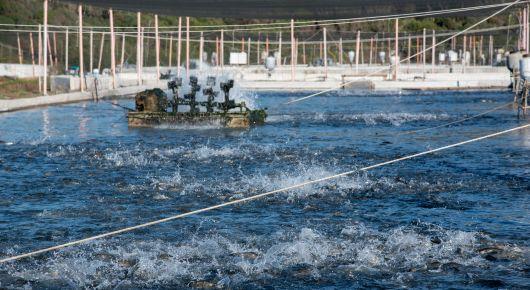Aquaculture value chain actors enhance knowledge of post-harvest management practices

The international fish trade is expanding due to sustained demand, trade liberalization policies, globalization of food systems, and technological innovations. To address these and other issues arising from post-harvest management among actors in the aquaculture value chain, FAO’s timely FISHCap project conducted a three-day regional workshop in Bodrum, Turkey, which concludes today. Organized in partnership with the Aquaculture Producers Central Union of Turkey (SUYMERBIR), the workshop shed light on value chain analysis, development, and governance, with a view to promoting sustainable aquaculture.
The workshop participants included aquaculture value chain actors, researchers working on the aquaculture post-harvest value chain, and managers of fish and product-processing companies. The workshop aimed for three key outcomes: first, to deepen participants’ knowledge of the aquaculture value chain and post-harvest management; second, to provide relevant information on the dynamics of relevant value chains in international fish trade; and third, to exchange experiences on good practices in the region on post-harvest management, value chain development, and international trade.
The regional workshop started with opening remarks by Turgay Türkyılmaz, Deputy Director-General of Fisheries and Aquaculture of the Ministry of Agriculture and Forestry. Türkyılmaz emphasized that FISHCap is being implemented in the subregion on the basis of shared responsibility and scientific procedures.
“The regional workshop contributes to raising awareness about the key role of the aquaculture value chain in sustainable development of the sector and governance in Central Asia,” said Haydar Fersoy, senior FAO fishery and aquaculture officer, adding that the workshop also addressed global issues impacting the value chain.
The workshop featured presentations on a variety of topics related to value chain analysis in the aquaculture sector, with examples from Hungary, Kazakhstan, Turkey, and Uzbekistan discussed along with other relevant topics, including loss and waste in fish value chains, throughout the three days.
Today’s activities included a field visit to a fish farm and a fish processing facility and an event dedicated to the International Year of Artisanal Fisheries and Aquaculture 2022, with the participation of Viorel Gutu, FAO Representative in Turkey and Subregional Coordinator for Central Asia, and high-level officers from the Ministry of Agriculture and Forestry.
The FISHCap project was launched to support capacity building for sustainable fisheries and aquaculture management in Central Asia, Azerbaijan, and Turkey as part of the FAO-Turkey Partnership Programme and is funded by the Government of Turkey.
24 March 2022, Bodrum, Turkey
